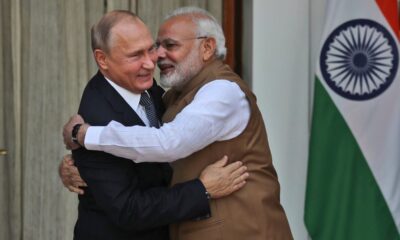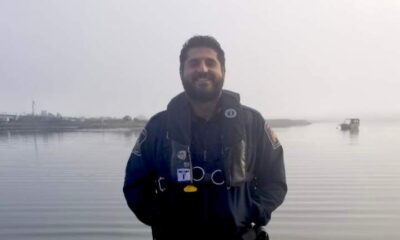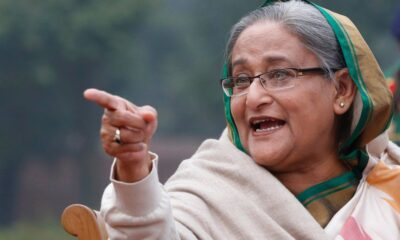Science
Experts Unite Against Antiscience in New Book, ‘Science Under Siege’

As the impacts of climate change and infectious diseases become increasingly apparent, two prominent scientists have come together to address the growing antiscience sentiment in their new book, Science Under Siege. Climate scientist Michael Mann and vaccine developer Peter Hotez aim to expose the coordinated efforts undermining scientific integrity and public trust in science.
Mann, a professor at the University of Pennsylvania, is known for his groundbreaking work on climate data, including the infamous hockey stick graph that illustrates the sharp rise in global temperatures since the early 20th century. Hotez, a microbiologist and pediatrician at Baylor College of Medicine, developed a low-cost, patent-free COVID-19 vaccine that has reached nearly 100 million people in India and Indonesia. Together, they highlight the challenges they face in their advocacy for science and public health.
Their book emerges at a time when the world is experiencing extreme weather events, such as flash floods, droughts, and wildfires, which align with predictions made by scientists in the 1970s. In the United States, the secretary of health and human services has voiced opposition to effective public health strategies, while misinformation proliferates, particularly from AI chatbots. Mann and Hotez’s work seeks to confront this troubling reality.
Unlikely Crusaders for Science
Neither Mann nor Hotez expected to become defenders of their fields. Both have faced significant backlash, including condemnation from Congress and threats from the public. The authors express their frustration with the current landscape, where they feel compelled to advocate for science in a hostile environment.
Mann and Hotez argue that climate change and infectious diseases are converging threats. Changing climates are altering the habitats and behaviors of wildlife that carry pathogens, increasing the likelihood of disease transmission to humans. They assert that a more significant danger than these threats is the antiscience movement itself, which they believe is driven by a concerted effort from the Republican Party and its allies.
They identify five key forces behind this antiscience campaign: plutocrats, petrostates, deceptive professionals, propagandists, and the press. The authors explain how these groups work together to spread misinformation, which undermines public understanding and trust in scientific facts.
A Historical Perspective on Antiscience
Mann and Hotez draw parallels between contemporary antiscience tactics and historical examples of authoritarian regimes that have targeted scientific inquiry. They reference the actions of Soviet leader Joseph Stalin, who suppressed scientific knowledge to further political ends, leading to widespread famine and suffering. The authors argue that discrediting science is a fundamental strategy for authoritarianism, aiming to destabilize societies by undermining trust in knowledge.
The authors also trace the evolution of misinformation around COVID-19, noting that initial denial of the virus’s existence quickly transformed into arguments against collective action to address the pandemic. This pattern mirrors the long-standing denial surrounding climate change, where economic fears are frequently prioritized over public health and environmental concerns.
Mann and Hotez contend that the spread of misinformation not only hampers effective responses to pressing issues but also creates division among the public, preventing collective action that is crucial for addressing complex challenges.
Ultimately, they argue that the future of humanity and the health of the planet are at stake. The authors call for a united front against these dark forces and advocate for political change as a means to restore faith in science. They stress the importance of voting and supporting politicians who prioritize scientific integrity over corporate interests.
While their message is critical and urgent, Mann and Hotez acknowledge the difficulty in shifting public perception. They express a sense of urgency, stating, “Only political change, including massive turnout to support politicians who favor people over plutocrats, can ultimately solve this larger systemic problem.”
In a world where the credibility of science is under attack, Science Under Siege serves as both a warning and a rallying cry. The authors hope to galvanize support for the scientific community and encourage individuals to take action in defense of truth and integrity.
-

 Politics4 weeks ago
Politics4 weeks agoSecwepemc First Nation Seeks Aboriginal Title Over Kamloops Area
-

 World5 months ago
World5 months agoScientists Unearth Ancient Antarctic Ice to Unlock Climate Secrets
-

 Entertainment5 months ago
Entertainment5 months agoTrump and McCormick to Announce $70 Billion Energy Investments
-

 Science5 months ago
Science5 months agoFour Astronauts Return to Earth After International Space Station Mission
-

 Lifestyle5 months ago
Lifestyle5 months agoTransLink Launches Food Truck Program to Boost Revenue in Vancouver
-

 Technology3 months ago
Technology3 months agoApple Notes Enhances Functionality with Markdown Support in macOS 26
-

 Lifestyle3 months ago
Lifestyle3 months agoManitoba’s Burger Champion Shines Again Amid Dining Innovations
-

 Top Stories2 months ago
Top Stories2 months agoUrgent Update: Fatal Crash on Highway 99 Claims Life of Pitt Meadows Man
-

 Politics4 months ago
Politics4 months agoUkrainian Tennis Star Elina Svitolina Faces Death Threats Online
-

 Sports5 months ago
Sports5 months agoSearch Underway for Missing Hunter Amid Hokkaido Bear Emergency
-

 Politics5 months ago
Politics5 months agoCarney Engages First Nations Leaders at Development Law Summit
-

 Technology5 months ago
Technology5 months agoFrosthaven Launches Early Access on July 31, 2025





















